Your End-of-Year Review of the 2018 LSATs
- by
- Dec 21, 2018
- LSAT
- Reviewed by: Matt Riley


You guys, it’s been another fantastic year of the LSAT in the books. Well, if you had to take the LSAT this year, “fantastic” might not be the word that immediately springs to mind. But, at any rate, this year is over. I mean, sure, we technically have eleven more days and two major holidays left to go in 2018 (three if you’re in a Commonwealth country — shouts to Boxing Day). But, for all LSAT-related intents and purposes, this year is over. The final LSAT came and went and was released. Registration for the next LSAT has closed. Our classes have been put on a momentary hiatus for the holidays.
So let’s take this momentary reprieve to reflect on 2018, the year that was. 2018 was a bit of a transitional year for the LSAT. 2019 will feature more changes to when and how the LSAT is administered than any year since the LSAT switched to the 120-180 scoring scale in 1991. Really, 2019 will feature more changes than every other post-1991 year combined. So the makers of the test used 2018 as an opportunity to try to smooth the transition to 2019. They added an extra LSAT and shifted the schedule to make the switch to a Seven-LSAT 2019 feel a bit less jarring. The test will go digital in 2019, so LSAC tested out the digital test through pilot programs in 2018 and offered a new online-based LSAT study system. LSAC tried to refine the way test takers could cancel their scores and how those non-canceled scores would get released.
But with changes looming to the format of the test, LSAC kept the actual content of the LSAT as standard as ever. In fact, 2018 had the most standard slate of LSATs of any year since I began teaching the LSAT. There were no super weird games. The increasing difficulty of Reading Comp appeared to abate. The weren’t really any exams that featured an unexpectedly large number of a given Logical Reasoning question type. The “curves” stayed between -10 and -11.
I see both of these developments as part of a larger trend: the LSAC, shockingly, is becoming more test taker-friendly. I mean, “test taker-friendly” is definitely a relative term — this is still an exam that expects almost half of the test takers to answer over half of the questions incorrectly. But, each of these changes — from more test administrations, to a simplified score release, to a more predictable, standardized standardized test — can only benefit those who choose to sign up to take the daunting test we call the LSAT. Here’s to more of these positive changes in 2019.
Today, we’ve decided to take a look back at each of the LSATs administered this year. We’ve aggregated the Logical Reasoning question distributions, Logic Game types for each exam, and the curves for each exam. We’ve also linked to everything we wrote about each exam. And at the end of this post, we’ll hand out some 2018 superlatives. Stay tuned for a later post where we review all the LSAT news from 2018.
LR Question Distributions in 2018
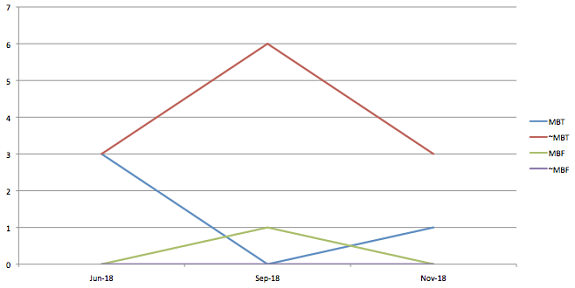
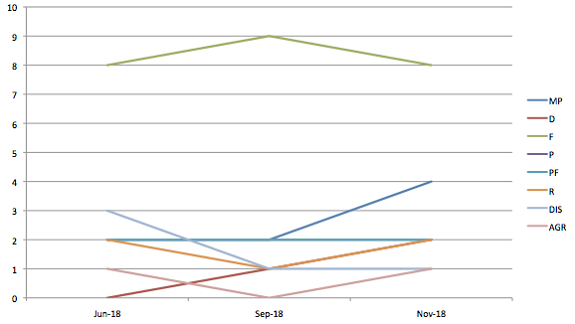
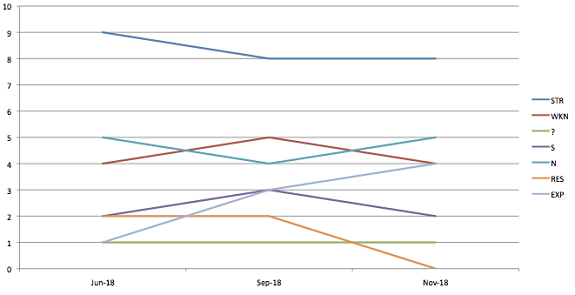
Game Types from Each Exam
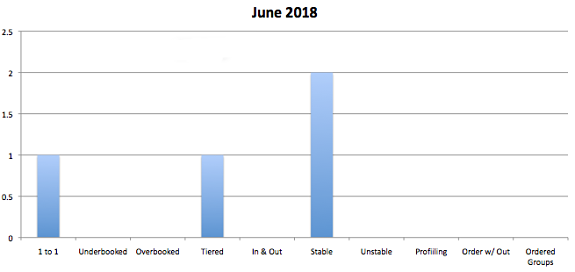
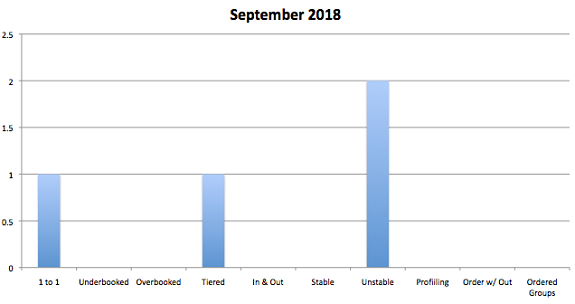
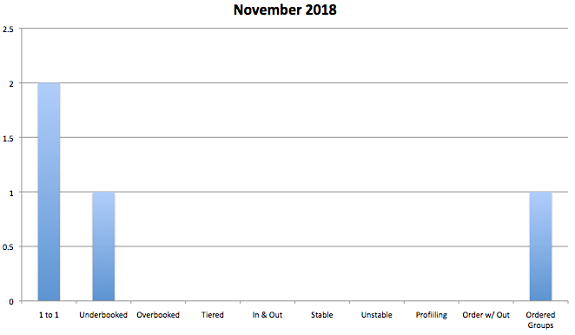
The Curves of 2018 Exams
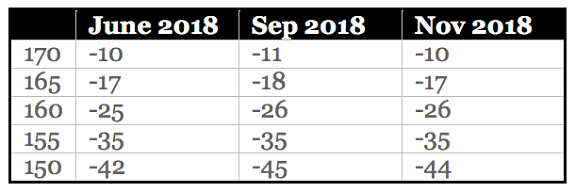
February 2018
We started 2018 off with the ultra-secretive February LSAT. And, as a result of the new LSAT schedule, this might be the last February test for a while. The February test was a causality of the addition of the January and March exams of 2019. So this year the February exam came to an ignominious end with an exam that test takers called “fine, I guess.”
Links:
Predictions
Instant Reaction
Morning Cometh Recap
Post-Exam Online Chatter
June 2018
Technically, according to LSAC, the LSAT year truly begins in June, so this was the official start to LSAC’s made up 2018-19 year. Whoever wrote this exam was clearly coming down from whatever psychotropic matter they consumed during their fake New Year’s Eve party, since the topics they chose to write about on this exam were super weird. There were comparisons to self-driving cars and fish biology, comments about chimps treating other chimps as their “associates,” a Reading Comp passage about using hypnosis to interview witnesses in criminal investigations, and a discussion of how one’s “blink rate” affects job performance.
Links:
Predictions
Instant Reaction
Morning Cometh Recap
Post-Exam Online Chatter
A Closer Look at All the Weird Stuff on This Exam
A Closer Look at the Score Release and Logical Reasoning
A Closer Look at Reading Comprehension
A Closer Look at Logic Games and the Curve
July 2018
For the very first July LSAT ever, the makers got a little lazy and phoned it in. They re-used a nondisclosed test that had previously been used for three separate LSAT administrations. And boy, did this get test takers heated. Also, there was a rare circular ordering game on this one, according to reports.
Links:
Predictions
Instant Reaction
Morning Cometh Recap
Post-Exam Online Chatter
September 2018
The September LSAT used to have the most test takers by far, but now it consistently has the second most, behind the end of the year LSAT. Which is all the evidence I need to get this cranky old man take off my chest. Young people: y’all late af. You wait until the last second to get off your phone and go to wherever you need to go. You dilly-dally and wait until the very last LSAT you can take. You took a long time to be born … like, I was born much earlier than you were. These are all things that should be held against you. Enjoy the much-diminished planet we left you.
Anyway, for those who got around to taking the September LSAT … it was pretty chill, as far as these things go.
Links:
Predictions
Instant Reaction
Morning Cometh Recap
Post-Exam Online Chatter
A Closer Look at the Score Release and Logical Reasoning
A Closer Look at Reading Comprehension
A Closer Look at Logic Games
A Closer Look at the Curve
November 2018
Finally, the November LSAT, the first of its name. This one was just released a few weeks ago. It had one of the hardest games of the year, but one of the more forgiving Reading Comp sections in recent memory.
Links:
Predictions
Morning Cometh Recap
A Closer Look at the November Exam
Superlatives:
Hardest Logic Game: “The Mining Game.” November 2018, Game 3.
Most Hated Reading Comp Passage: “Shelley v. Kraemer.” September 2018, Passage 1.
Worst Writing: “The team must work for at least one month at headquarters between any two months working at different mines,” November 2018, Game 3.
Most Unintentionally Funny Sentence: “Constructing a self-driving robotic car requires expertise in fish biology,” June 2018, Logical Reasoning.
Most Mysterious Question: This question about either rabies, or maybe rabbis, creating vampires. February 2018, Logical Reasoning.

Search the Blog

Free LSAT Practice Account
Sign up for a free Blueprint LSAT account and get access to a free trial of the Self-Paced Course and a free practice LSAT with a detailed score report, mind-blowing analytics, and explanatory videos.
Learn More
Popular Posts
-
logic games Game Over: LSAC Says Farewell to Logic Games
-
General LSAT Advice How to Get a 180 on the LSAT
-
Entertainment Revisiting Elle's LSAT Journey from Legally Blonde








